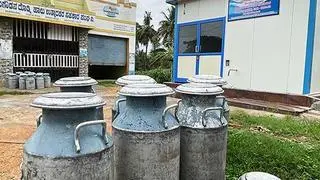While cooperative major IFFCO’s innovation in bringing nano urea has been lauded by the government, which is keen to see an expansion in production of this liquid fertiliser at the earliest, private companies are not that enthused to go for it unless they are assured of the sales.
“I have spoken to various private companies. They are not very sure at this stage whether to go for the technology. They say that they will think about it two or three years down the line. Or they may develop their own technology,” a fertiliser ministry official was quoted as saying before the parliamentary standing committee of fertilisers. The panel submitted its report on Monday.
While some fertilizer companies may take it from IFFCO, some others are developing their own nanotechnology, the official said adding, it is too early to say anything on this as the panel was of the view that transfer of nano urea technology to the private sector could be a game changer in the world economy if it grew appropriately and within the time period specified for the same.
Commercial production
IFFCO has already commenced the commercial production of nano urea at its Kalol unit and it intends to set up five additional facilities across the country in the next 12-22 months to increase the availability. Besides, public sector companies National Fertilizers Limited (NFL) and Rashtriya Chemicals and Fertilizers (RCF) aim to make their nano urea plants operational by July, 2024.
Earlier, NFL and RCF had signed non-disclosure agreement (NDA) and memorandum of understanding (MoU) with IFFCO for transfer of technology. The government has also been asking IFFCO to transfer the technology to another PSU-- Brahmaputra Valley Fertilizers Company Limited (BVFCL)--free of cost.
Nano urea has been developed for the first time in the world by IFFCO and the government allowed its usage in February, 2021. Till date, 2.40 crore nano urea bottles have been manufactured by IFFCO, the panel said in the report.
Experts optimistic
Nano urea contains nitrogen particles of 20-50 nanometres. This is very small in size and one conventional urea prill, the average thickness of which is 2.8 mm, equals to 55,000 nano urea particles in size. One bottle of 500 ml costs ₹240 whereas the conventional subsidized urea is sold at ₹266.5 per 45 kg bag. Since a farmer can take 20 nano bottles to field in a bag, whereas 20 urea bags need a tractor, there is likely to be a preference for this liquid fertiliser very soon, many experts have said.
Though the government is confident that nano urea has the potential to replace the conventional urea, unfortunately while ₹10 lakh is to be used to promote nano urea (in FY22), expenditure as on January 31 is zero, according to the report. The government, however, believes that with all these eight plants operational, the total capacity will rise to 44 crore bottles per year (equivalent of 198 lakh tonnes of conventional urea).








Comments
Comments have to be in English, and in full sentences. They cannot be abusive or personal. Please abide by our community guidelines for posting your comments.
We have migrated to a new commenting platform. If you are already a registered user of TheHindu Businessline and logged in, you may continue to engage with our articles. If you do not have an account please register and login to post comments. Users can access their older comments by logging into their accounts on Vuukle.